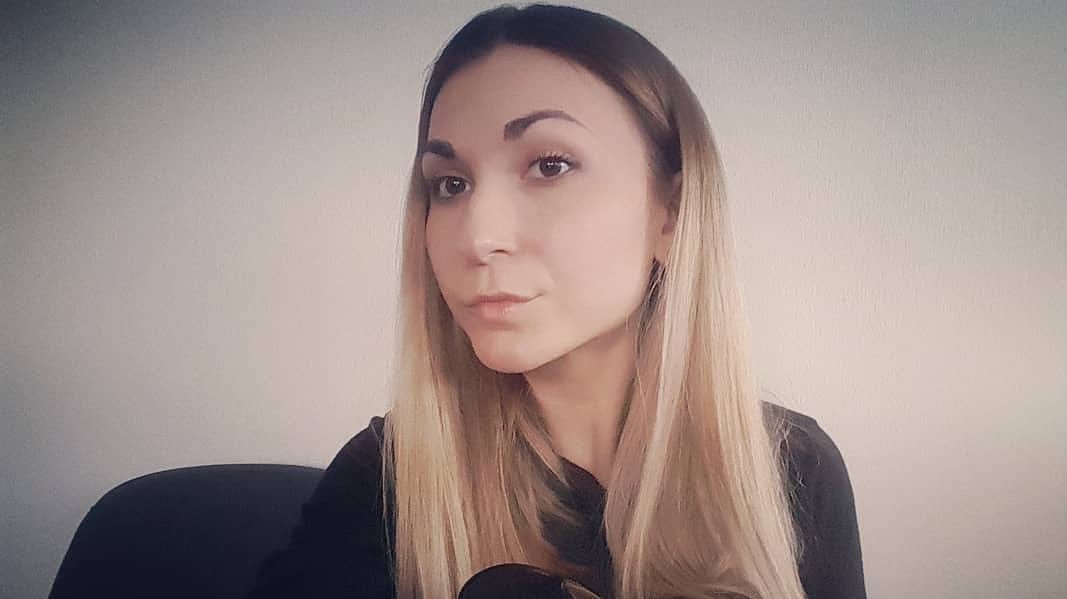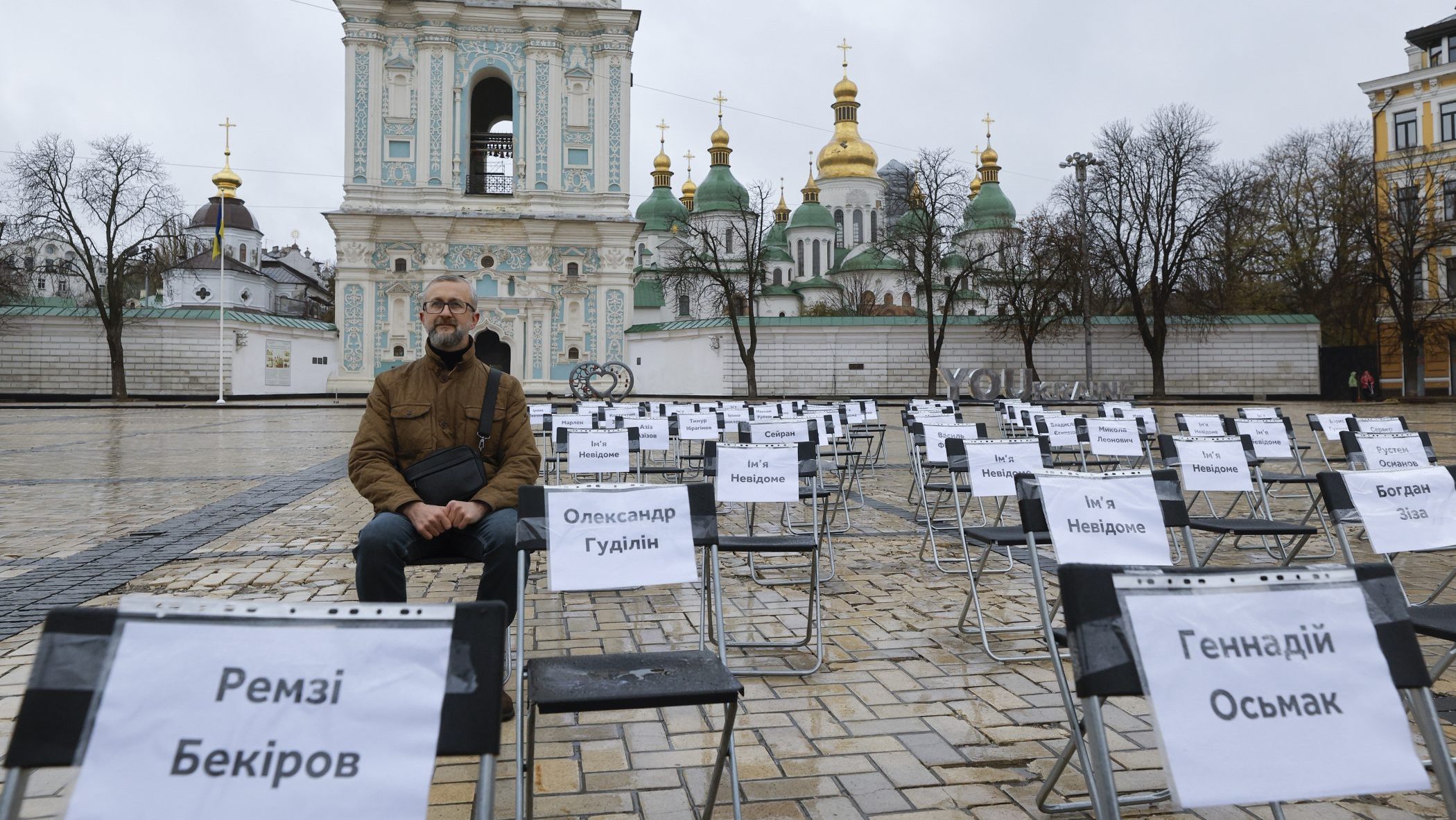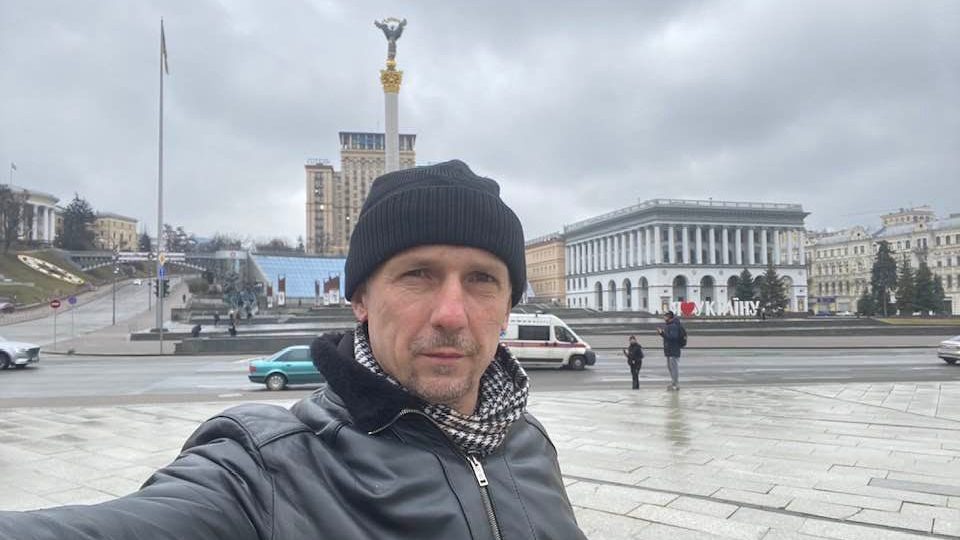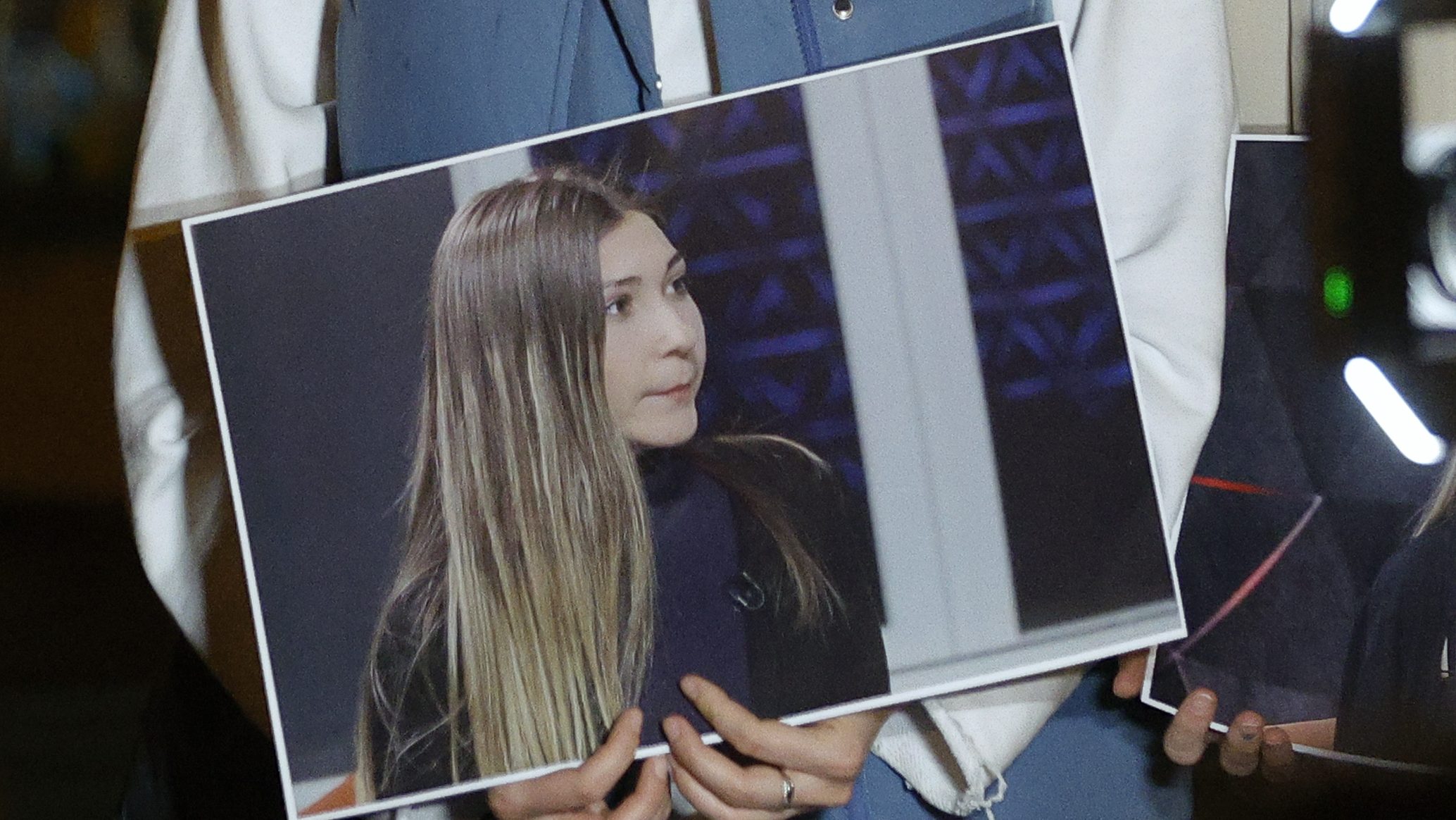This post is also available in: Bosnian
The father of Ukrainian journalist Viktoriia Roshchyna, who went missing in the summer of 2023 and was detained in Russia, received a letter last month from the Russian Ministry of Defence.
It informed him that Roshchyna had died in custody and that they intended to repatriate her body as part of an exchange of war dead with Ukraine.
More than a month has passed since then, but despite the assurances, Russia has not yet returned his daughter’s body for burial.
The Ukrainian organisation Media Initiative for Human Rights, MIHR, said Roshchyna had been working as a freelance journalist when she was taken. She had worked for various Ukrainian and international media outlets and disappeared during a field trip to the Russian-occupied part of Ukraine’s southeastern Zaporizhzhia region in August 2023.
Roshchyna had been gathering material for publication about the occupiers holding elections for the Russian parliament, the destruction of the Kakhovka hydroelectric power station and the situation at the Zaporizhzhia nuclear power plant in Eherhodar.
Russia kept her incommunicado for more than a year, the MIHR said, officially recognising her detention only in May 2024, but without clarifying the legal processes against her or allowing her to see a lawyer.
“There was an extremely limited amount of information, and no responses to official requests made by the family. For a long time, the family has been in a state of such uncertainty that it can be considered torture, as the uncertainty about the fate of their family member has affected their psycho-emotional state,” said Yevheniia Kapalkina, from the human rights organisation Ukrainian Legal Advisory Group, which is representing the family.
 Viktoriia Roshchyna. Photo: Facebook
Viktoriia Roshchyna. Photo: Facebook
The Ukrainian media rights organisation, the Institute of Mass Information, IMI, says that 30 journalists are currently illegally imprisoned by Russian forces in Ukrainian-occupied territory, including in Crimea.
The chair of the IMI, Oksana Romaniuk, said Russia and its proxies have detained 60 media workers, citizen journalists and bloggers since 2014. Some of them, she added, were arbitrarily detained without any charges or procedural status.
According to Kapalkina, the Russian Ministry of Defence only relays partial information about detainees held by Russia to their families through the International Committee of the Red Cross, ICRC.
Information is not provided in all cases, and when it is, often it is not enough for the families to understand the current situation in which their loved ones are being held because they receive the news late and all correspondence is censored.
According to a Facebook post by Tetiana Katrychenko, director of the MIHR, Roshchyna was held in at least two penal colonies, in Russian-occupied Berdiansk and in Taganrog, in the Rostov region of Russia.
“Since the first months of the full-scale invasion, Russians have been using both places to detain Ukrainian military and civilians, including women,” Katrychenko wrote.
“Taganrog (and Berdiansk where torture with electric shocks was documented) is known as one of the most brutal places of detention for Ukrainians in the Russian Federation. Former prisoners call it hell on earth,” she added.
Journalists seen as ‘the enemy’
 The ‘Empty Chair’s event in Kyiv this month publicised the plight of arrested, captured and missing Ukrainian writers, journalists and human rights activists seized by Russia. Photo: EPA-EFE/SERGEY DOLZHENKO
The ‘Empty Chair’s event in Kyiv this month publicised the plight of arrested, captured and missing Ukrainian writers, journalists and human rights activists seized by Russia. Photo: EPA-EFE/SERGEY DOLZHENKO
IMI chairperson Oksana Romaniuk said that Russia has repeatedly sought to portray captive Ukrainian civilians as prisoners of war.
“An example is Dmytro Khyliuk . From time to time, we see him mentioned in various Russian Telegram channels and captioned as some kind of military man. But he absolutely had nothing to do with the army. This way the Russians are trying to argue why they are illegally detaining a civilian,” Romaniuk said.
According to the IMI, almost all those who have been released from arbitrary imprisonment report torture, ill-treatment and refusal to provide medical assistance to prisoners in detention.
“Russia considers journalists to be enemies,” Romaniuk said. “We see this not only in the way they take journalists hostage. We also see this when Russian snipers shoot at people marked as the press,” she said.
She cited the case of Bohdan Bitik, a Ukrainian working for the Italian newspaper La Repubblica who was killed in a Russian attack in Kherson in April 2023.
“He was shot by a sniper, although he was wearing this blue ‘Press’ vest and had a camera in his hands,” she explained.
According to the IMI, since the full-scale invasion began, Russia has killed 12 journalists in Ukraine, both local and foreign, while they were carrying out their professional duties.
The head of the criminal legal policy department at the Ukrainian prosecutor general’s office, Oleksiy Bonyuk, has stated that by November 2024, the office was investigating 107 war crimes committed against journalists.
According to Bonyuk, there have so far been four indictments charging nine people in cases related to crimes against journalists, three of whom have already been found guilty.
Abductions are ‘systematic’, say activists
 Dmytro Khyliuk. Photo: Facebook
Dmytro Khyliuk. Photo: Facebook
Ukrainian human rights activists allege that there is a systematic Russian practice of abducting journalists in the occupied areas, holding them incommunicado and ill-treating them, and that there has been a lack of international pressure to stop such crimes.
Before Russia’s full-scale invasion of Ukraine on February 2022, Anastasiia Hlukhovska, a journalist from Melitopol, in the Zaporizhzhia region, worked for local outlet RIA Melitopol, specialising in social issues, said her sister, Diana.
“In the very first days of the invasion, Melitopol was occupied by Russian forces. We all realised that Anastasiia had to stop doing journalism because journalists are at risk. It’s not that they are just risking their careers or anything like that, they are risking their lives,” said Diana Hlukhovska.
“After that, Anastasiia didn’t do any journalistic work, just ran the household. She was at home almost all the time in Melitopol and we talked regularly. Everything was relatively good, but she was constantly afraid that something would happen, even though she had cut off all ties with the profession,” she continued.
On August 20, 2023, Anastasiia Hlukhovska stopped responding to calls. As her sister later found out, the Russian military had abducted her from her home and searched her apartment. “She was supposed to meet our mother that day,” she said.
According to her sister, Anastasiia has not been in touch since. Their mother went to the occupying commander’s headquarters in Melitopol and tried to find out where her daughter was being held. But everywhere she went, she received the response that her daughter was not there.
“We made inquiries. The FSB said they knew nothing. Well, of course. But the Russian prosecutor’s office confirmed to us that Anastasiia was taken into custody,” Diana Hlukhovska said.
About a year ago, she saw a video on Telegram in which she recognised Anastasiia with several other people being detained.
At dawn on the same day that Anastasiia was seized, Russian forces also seized three administrators of Melitopol-based Telegram channels that distribute local news, Heorgiy Levchenko, Yana Suvorova and Vladyslav Hershon. According to Reporters Without Borders, at the end of September this year, they were possibly being held in the Russian-occupied city of Mariupol in the Donetsk region.
For more than a year, Anastasiia Hlukhovska’s family has had almost no news about her. Her relatives collect any references they see to her in the media or get from released Ukrainian prisoners of war who are often held by Russia together with arbitrarily imprisoned civilians.
“We know she was in Melitopol last August, when she was captured. And recently we found out that she was in Taganrog ,” Diana Hlukhovska said. “The family is in a state of such uncertainty that it’s like a form of torture.”
 Commemoration of Viktorii Roshchyna in Kyiv. Photo: EPA-EFE/Sergey Dolzhenko
Commemoration of Viktorii Roshchyna in Kyiv. Photo: EPA-EFE/Sergey Dolzhenko
Geneva Conventions not observed
Some Ukrainian journalists have been illegally detained in Russia for almost the entire period of Russia’s full-scale invasion, such as UNIAN news agency correspondent Dmytro Khilyuk.
Khyliuk and his father were abducted by the Russian military in March 2022 during their occupation of the Kyiv region, seized from their home village of Kozarovychi. Eight days later, his father was released.
The Russian military first kept Khyliuk in a warehouse in Kozarovychi and in the neighbouring village of Dymer in Kyiv region, and later took him with them as they retreated.
For a long time, there was no information about Khyliuk’s whereabouts. But from interviews with released Ukrainian prisoners of war, his relatives and Ukrainian human rights groups found out that he had been transferred to Pakino, a village in Russia’s Vladimir region, east of Moscow.
Oksana Mykhalevych, a lawyer for his family, said that this spring, Khilyuk’s parents received a message from the Russian Ministry of Defence confirming that their son was being held in Russia. Since then, they have not heard anything.
According to Mykhalevych, the Russian letter refers to international conventions on treatment of prisoners of war and says information about him and his prisoner card have been transferred to the ICRC.
Khilyuk’s family then tried to write to him.
“When some prisoners who had contact with Dmytro while they were in captivity finally got released, they said that Dmytro had not received any letters from his family,” Mykhalevych said.
“So this mechanism provided for by the Geneva Conventions, to which the Russian Ministry of Defence referred in the letter, does not work. They wrote that you can apply through the ICRC and send correspondence and parcels, and they will be handed over. But nothing of the kind happens,” Mykhalevych added.
In July 2024, Reporters Without Borders published the testimony of a Ukrainian prisoner of war who had been released from captivity. He said that he had spent almost a year in the same cell with Khilyuk. According to the freed prisoner, Khilyuk “weighed no more than 45 kilograms” in their time together and did not look much like the photos shown to him for identification.
In a report on Ukrainian civilians arbitrarily detained by Russia, published in spring this year, international experts from the OSCE’s Moscow Mechanism said journalists and human rights defenders have been specifically targeted for enforced disappearances and arbitrary detention in Russia along with local authorities and other public figures who the Russians consider local opinion leaders.
The executive director of the MIHR, Tetiana Katrychenko, said that Russia has been tracing people who have been trying to report on what is happening in the occupation since 2014. She claimed that not only professional journalists are being attacked, but also people who have decided to take over the job of reporting in places where professional Ukrainian journalists have been forced to leave for security reasons.
“It’s not so much about the movement of military forces and equipment, but also about trivial things like curfews, the fact that a certain area was actually hit by artillery or drones,” Katrychenko explained.
“We know that a group of people in Russian-occupied Donetsk are being held in penal colonies now, and in pre-trial detention centres before, who were preparing tweets about events in the city. And they were detained for this, and the occupying authorities called them ‘Twitterists’ in their publications. So it’s definitely an attempt by Russia to close down channels that transmit information to the public,” she said.
The Russian Ministry of Defence and penitentiary service did not answer questions about forcibly disappeared Ukrainian journalists by the time of publication.
Kateryna Dyachuk, head of the freedom of speech monitoring department at the Institute of Mass Information, said that since 2014, when Russia began to seize Ukrainian territory, the IMI has recorded 634 alleged crimes against the media, including murders, cyberattacks and attacks on media infrastructure, such as the shelling of Ukrainian TV towers.
“Russia is doing everything it can to wipe out the information that journalists collect and report to the world,” Dyachuk said. “Russia is doing everything to shut them up.”


